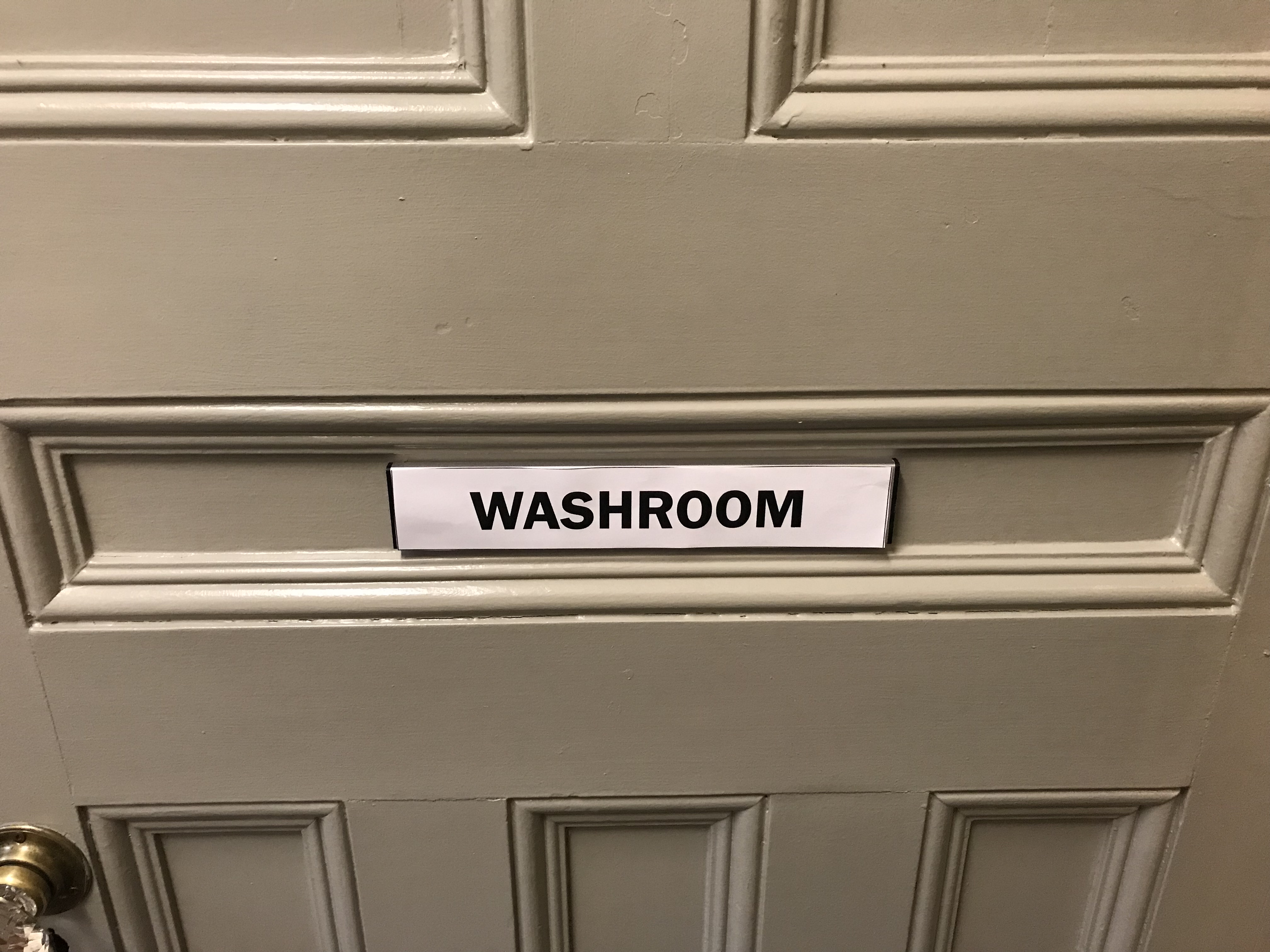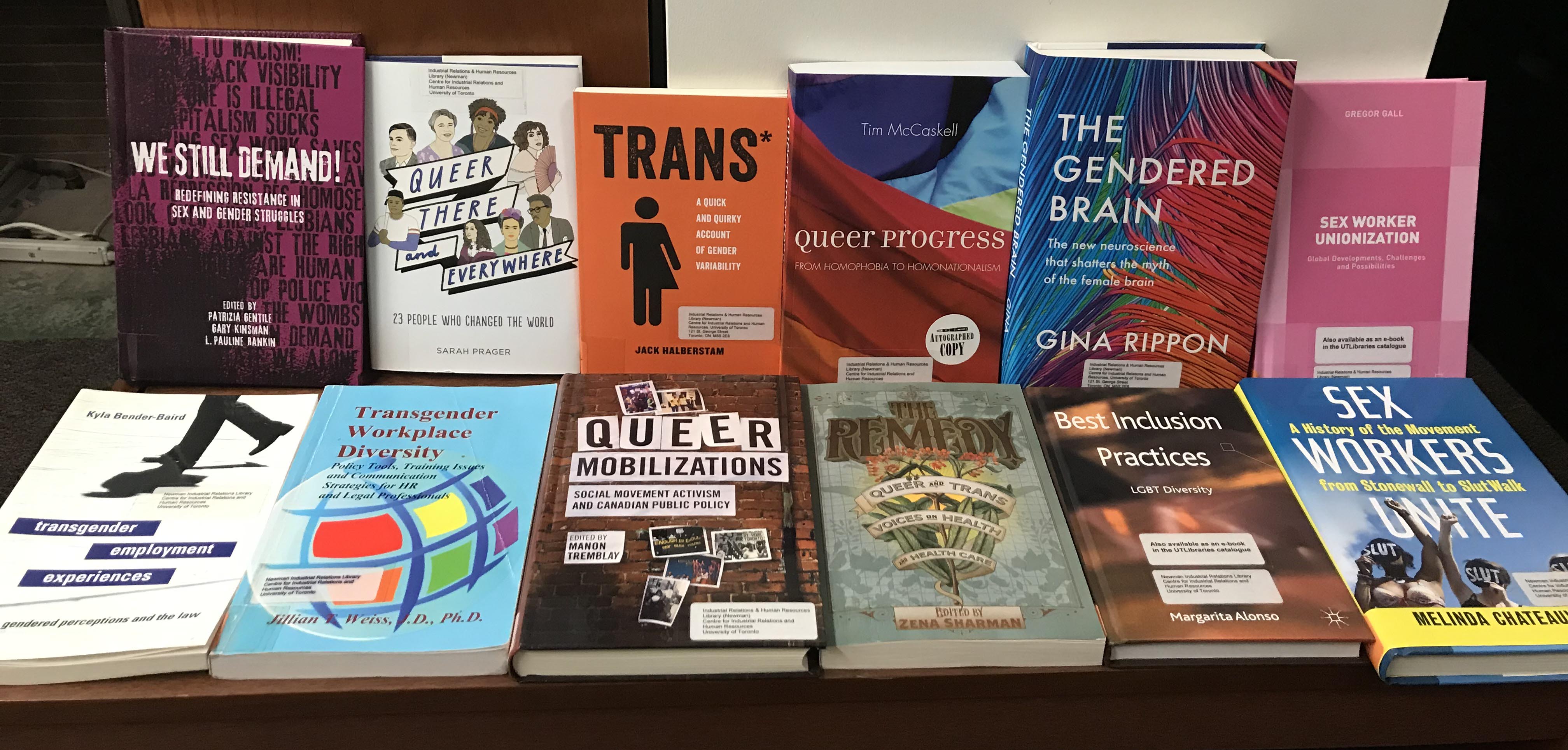Thursday, June 13th is #DisplayYourPride day at the University of Toronto.
Every year, we celebrate alongside other departments and offices on campus with flags, posters, and a selection of books showcasing 2SLGBTQQIA inclusion in the workplace. This year, we are doing something extra.

It’s a small change – these washrooms were, and remain, single-user facilities. But adding the two central washrooms to the existing all-gender options upstairs and in the basement puts equity and 2SLGBTQQIA inclusion front and center for this workplace, and for the workplaces of the future labour relations professionals who study here.
Equitable washroom polices are one of the Best Practices identified by the Ontario Human Rights Commission for preventing discrimination because of gender identity and expression.
"Washrooms and change facilities policy
- Recognize the right of trans people to access facilities based on their lived gender identity.
- Communicate that a trans person will not be required to use a separate facility because of the preferences or negative attitudes of others.
- Make clear that accommodation options will be provided on an individualized basis, if a trans person requests. Provide privacy options that anyone in a change room may choose to use.
- Provide information on where people can find accessible, all-gender washrooms."
-- Appendix C: Best practices checklist, Policy on preventing discrimination because of gender identity and gender expression, Ontario Human Rights Commission
You can find more singe-user and all-gender washrooms on the University of Toronto capmus from the Sexual and Gender Diversity Office.
Want to learn more about trans issues in the workplace?

#trans on the CIRHR Library Tumblr
Academic Articles
Elias, Nicole M.; Johnson, Rana Lynn; Ovando, Danny; and Ramirez, Julia (2018) "Improving Transgender Policy for a More Equitable Workplace," Journal of Public Management & Social Policy: Vol. 24 : No. 2, Article 7. Available at: https://digitalscholarship.tsu.edu/jpmsp/vol24/iss2/7
McFadden, C. (2015). Lesbian, Gay, Bisexual, and Transgender Careers and Human Resource Development: A Systematic Literature Review. Human Resource Development Review, 14(2), 125–162. https://doi.org/10.1177/1534484314549456
Robinson, M. J., Van Esch, C., & Bilimoria, D. (2017). Bringing Transgender Issues Into Management Education: A Call to Action. Academy of Management Learning & Education, 16(2), 300–313. https://doi.org/10.5465/amle.2015.0355
Rudin, J., Yang, Y., Ruane, S., Ross, L., Farro, A., & Billing, T. (2016). Transforming Attitudes About Transgender Employee Rights. Journal of Management Education, 40(1), 30–46. https://doi.org/10.1177/1052562915609959
Sawyer K., Thoroughgood C., Webster J. (2016) Queering the Gender Binary: Understanding Transgender Workplace Experiences. In: Köllen T. (eds) Sexual Orientation and Transgender Issues in Organizations. Springer, Cham
Sawyer, K., & Thoroughgood, C. (2017). Gender non-conformity and the modern workplace. Organizational Dynamics, 46(1), 1–8. https://doi.org/10.1016/j.orgdyn.2017.01.001
Thoroughgood, C., & Sawyer, K. (2017, October 3). Research: Why Employer Support Is So Important for Transgender Employees. Harvard Business Review. Retrieved from https://hbr.org/2017/10/research-why-employer-support-is-so-important-for-transgender-employees
Thoroughgood, C. N., Sawyer, K. B., & Webster, J. R. (2017). What lies beneath: How paranoid cognition explains the relations between transgender employees’ perceptions of discrimination at work and their job attitudes and wellbeing. Journal of Vocational Behavior, 103, 99–112. https://doi.org/10.1016/j.jvb.2017.07.009


